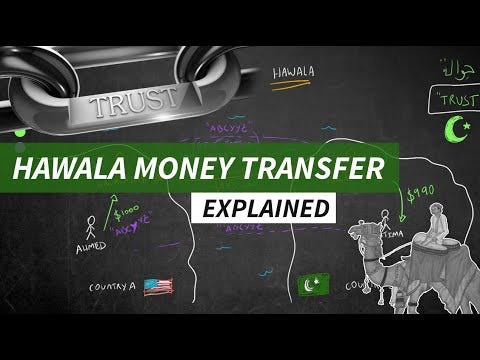Hawala is a method of transferring money outside traditional financial institutions or banking systems. It is a trust-based system that relies heavily on personal relationships and the reputation of the Hawaladar or the person facilitating the transfer.
In a typical Hawala transaction, the sender gives money to a local Hawaladar, who then contacts a corresponding Hawaladar in the recipient's country. The corresponding Hawaladar then distributes the funds to the recipient. The transfer is often completed within hours, and the fees are typically much lower than those traditional banking institutions charge.
One of the key advantages of the Hawala system is that it is incredibly flexible and can be used to transfer money across borders, even in countries with strict currency controls or where it is difficult to access traditional banking services. The Hawala system is also highly resistant to fraud and money laundering, as the reputation of the Hawaladars is critical to the success of the system.
However, it is essential to note that the Hawala system has risks. Because the system operates outside of traditional banking channels, there is no regulation or oversight, making it vulnerable to abuse. Additionally, because the system relies so heavily on personal relationships and trust, it can be difficult for outsiders to access.
Overall, the Hawala system is a fascinating and complex method of transferring money that has been used for centuries across many different cultures and regions. While it has its risks, it remains a popular and effective way of moving funds for many people worldwide.
Hawala is a traditional system of transferring money that originated in South Asia. "Hawala" is derived from the Arabic term "Hawalaat," which means exchange or transfer. This system is also commonly called "Hundi" in India and Pakistan.
The Hawala system is based on trust between the hawaladars, who are the operators of this system. The hawaladars act as intermediaries between the sender and the receiver of the money. They have a vast network of agents in different parts of the world, making transferring money fast and easy.
The process of transferring money through Hawala is simple. The sender gives the money to a Hawaladar, who gives the receiver a code or password. The receiver can then collect the money from another hawaladar, who has the password or code. This system is highly effective in areas where traditional banking systems are not easily accessible or trustworthy.
One of the key benefits of the Hawala system is its speed and efficiency. The money can be transferred instantly, and no lengthy paperwork or verification processes are involved. Additionally, the Hawala system is highly secure and confidential, which makes it an attractive option for those who want to keep their financial transactions private.
Acknowledging that any government or financial institution does not regulate the Hawala system is essential. This lack of regulation can make the system vulnerable to illegal activities such as money laundering and terrorist financing. Despite this, the Hawala system remains a popular method of transferring money in many parts of the world.
Regarding international money transfers, the Hawala system is a popular and effective way of sending money from one country to another. The process works by approaching a hawaladar, an intermediary between the sender and receiver. Once the sender provides the amount they want to transfer and the receiver's details, a Hawaladar contacts an agent in the receiver's country and provides them with the transaction details. The agent then contacts the receiver and provides them with the money, allowing them to collect it without hassle.
While some may worry that the Hawala system could be used for illegal activities such as money laundering or financing terrorism, it's important to note that hawaladars maintain detailed records of all transactions, making them accountable to the authorities. Furthermore, the system is based on trust, so any hawaladar found involved in illegal activities would lose the trust of their clients and be out of business.
One of the main benefits of the Hawala system is its affordability and speed compared to traditional banking channels. It's a precious system for people who need access to formal banking channels but want to avoid paying high transaction fees charged by banks.
Despite its proven effectiveness, exercising caution when using the Hawala system and only working with trusted hawaladars is essential. This traditional system has been used for centuries and is still relevant today, making it a valuable option for those needing international money transfers.



